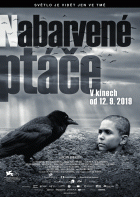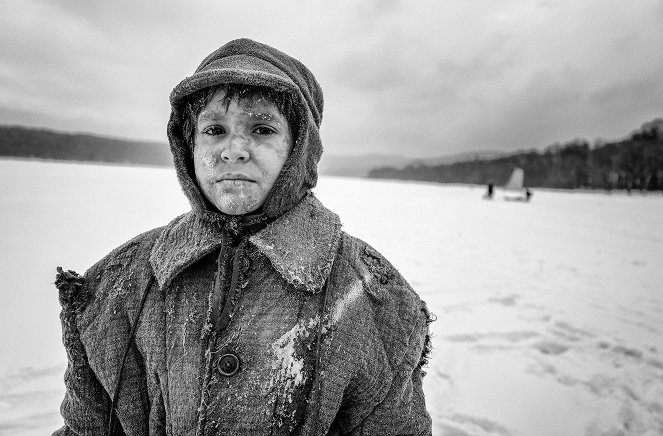Directed by:
Václav MarhoulScreenplay:
Václav MarhoulCinematography:
Vladimír SmutnýCast:
Petr Kotlár, Udo Kier, Michaela Doležalová, Zdeněk Pecha, Lech Dyblik, Jitka Čvančarová, Stellan Skarsgård, Harvey Keitel, Julian Sands (more)VOD (1)
Plots(1)
Trying to protect their child from the mass extermination of Jews, a Jewish couple sends their son to a relative in the countryside somewhere in Eastern Europe. However, the boy's aunt dies unexpectedly and the child is forced to set out on a lone journey through the wild and hostile world governed only by local rules, prejudices and superstitions. When the war ends, his fight for physical survival is replaced by a different kind of a fight. A battle he may not even be aware of, a battle with himself, a battle for his soul, his future... (Bioscop)
(more)Videos (4)
Reviews (14)
This film is saved by its black-and-white cinematography, framing and lighting, as well as by the depiction of the era with the right set designs and costumes. The narrative structure, however, is completely monotonous, devoid of any dramatic arc, artistic symbolism, more sophisticated editing techniques and internal emotional development, which could have been at least partially provided by (unfortunately completely absent) music. The Painted Bird misses most of what this type of film needs. The characters have well-chosen faces, but they only appear for a few minutes, barely speak and give nothing to the film. Their ugliness just contributes to the premature loss of the boy’s innocence in a nasty environment. And we come to understand that this loss is the point of the whole film only in the last few minutes, after almost three hours of monotonous stacking of the similarly looking and sounding episodes on top of each other.
()
I don’t watch Czech films these days, they don’t interest me and I don’t see in them anything original and authorial in terms of style and narration (when I happen to stumble upon them on TV). The Painted Bird is not the revolutionary and morally questionable movie the initial responses made us believe, but it’s nonetheless honest, intimate and thoughtful filmmaking of the kind other domestic productions can not match. There have been comparisons with Tarkovsky or Markéta Lazarová, but I wouldn't go that far; Marhoul is more sober and more naturalistic, and also more accessible from a narrative standpoint. The black and white composition is an understandable and correct step for such bleak material, while the taciturnity combined with the overuse of details and the sparse editing allow for a deeper immersion of the viewer in the atmosphere so they can be ready to react with empathy to all the horrors in front of them, which the camera tastefully hides most of the time, so the story will not feel gratuitously violent. The narration consists of simply intertwined episodes with the unifying motif of the complex development of the protagonist – complex only in the sense that each chapter shapes a different side of Jošek's personality and gives him experiences that help him grow up in that terrible environment without real love. Otherwise, the development is not too surprising, Marhoul relies mainly on changing of moral environments, which take second place to the objective statements of the cruelty of war, the misery associated to it and the religious fanaticism of the predominantly rural civilians. It is a pity that in the episodic structure this secondary function gradually becomes stronger than the repeated suffering of the main character. Overall, however, I must praise it, The Painted Bird looks beautiful, it doesn’t get boring despite its runtime and the repetitiveness, the performances and the casting of the repulsive village folk are perfect (even I could have had a small role), and it presents big ideas and a cruel vision of human nature with a strong author’s signature (though I couldn’t avoid laughing when I heard the Wilhelm Scream when someone fell off a horse). A case of impressive filmmaking that may not have that huge an impact on savvy viewers despite its great ambitions, but that with every shot and scene it screams that it should be taken seriously here and abroad – and that, fortunately, it doesn’t get too annoying even after two hours.
()
After Tobruk, Václav Marhoul convinced me for the second time that he and I are simply not on the same wavelength. Now, after the almost three-hour ‘frantic ride,’ I can’t help but wonder what he wanted to convey with this film. Next to Come and See and Hatred, The Painted Bird feels rather underwhelming. The information that the story takes place during WWII came to me only in the form of a Storch flying over, other indications appeared much later. I still don't know where the story was set (Carpathian Ruthenia?). I also didn't understand why the little Jew was played by a Gipsy. The story unfolded in a very awkward way. Throughout the film I felt like it was weirdly cut, I was annoyed by its strange rhythm: boring, boring, boring - brutal violence - boring, boring, boring - brutal violence - boring, boring, boring – pedophilia - boring, boring, boring - zoophilia, etc. I also didn't understand why there was violence in the film in the first place when the creators were obviously more afraid of it than the viewers. That way, most scenes look silly bordering on ridiculous. For example, the completely pointless zoophilia scene had me in stitches, Václav Marhoul can't have been serious. On the other hand, if Fifty Shades of Grey gives you goosebumps, this will be a rough experience for you, which might even lead to some involuntary bedwetting. At least I already know what those awards were for. Wait... actually, I don't. P.S. Those bikini tan lines on Denisa Pfauserová sure looked historically accurate :-)
()
Don't get mad at me, but this is literally a hodgepodge of random scenes in a tedious three-hour runtime. I appreciate Václav Marhoul's effort to try something new and in a way he succeeded, because in all the Czech cinematic garbage he managed to create something of quality, worldly, innovative and unconventional, but I personally don't like the result that much. Trying to make the whole point of "a good child turning evil as a result of the corruption of the world around him" is presented in a terribly skeletal way, with the boy going from village to village, encountering only evil everywhere, and the whole thing feels like 300 scenes cut from a different film each time, the shots are empty and bland, the actors barely speak, and there is no story. I really don't understand what we are supposed to take away from the film. The generation of "our parents" has no chance to put in 170 minutes of running time, the film nerds won't be shocked by the scenes, because we've seen similar things on a much crueler scale countless times before, and there's actually nothing as brutal and naturalistic as advertised. That leaves me with the last group, the film critics, but I think they're just singing odes to the film. Strange and weird, but unfortunately also boring, bland, tedious and unreflective. Some will like it, but I'd say most will have a hard time making it to the end. Unfortunately, not because of the crudeness, but just because of the insane boredom.
()
Ideally, Czech cinematography should have a big, ambitious film like this at least a couple of times a year, so one The Painted Bird wouldn’t get such an aura. But we don’t have that and with this work Marhoul is objectively several streets head of any recent Czech competition, and they simply can’t catch him. A great and stylish film, world-class. I didn’t enjoy it enough for a five-star rating because it’s not really possible to “enjoy” it. It is exhausting, rather. But a well earned four starts, without any doubt. Now, to create a media aura around this film as if it was some sort of exploitation war horror movie is incredibly absurd. Sure, there are some horrible and monstrous things, but Marhoul approaches them with a lot of decency, with chastity almost. And if the hysterical responses from Venice are anything to go by, it's just that the snobs from these big festivals like to fall into cheap headlines ... and that crap will last.
()



Ads